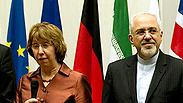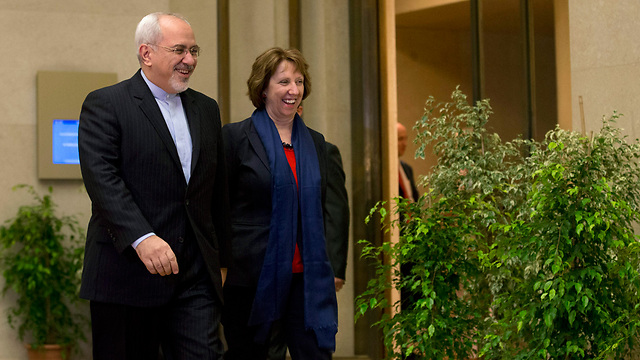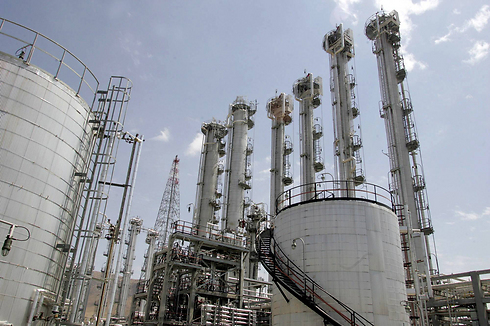
Iran, 6 powers seek to salvage momentum for nuclear deal
Recent high-level US-Iran talks, meant to pave the way to a final deal, only highlighted the huge differences.
VIENNA - Iran and six world powers re-launched talks on Tuesday to rescue prospects for a deal on Tehran's nuclear activity by a July deadline, striving to prevent a long-time standoff from descending into a wider Middle East war.
With time running short if a risky extension of the nuclear talks is to be avoided, negotiators face formidable challenges to bridge gaps in positions over the future scope of Iran's nuclear program in less than five weeks.
The talks, coordinated by European Union foreign policy chief Catherine Ashton, stumbled during the last round in mid-May, when diplomats had hoped to start drafting the text of a future agreement. Both sides accused the other of lacking realism in their demands and French Foreign Minister Laurent Fabius said the negotiations had "hit a wall".
Related stories:
- Fifth round of Iran nuclear talks begins as time is running short
- Iran would resume enrichment if nuclear talks fail
- France says Iran must budge on centrifuges for nuclear talks to succeed
Although such rhetoric may in part be a negotiating tactic, it also underlines how far the sides are from resolving a dispute that could unleash war in the region. Israel sees a nuclear-armed Iran as an existential threat and has in the past suggested it could carry out air strikes on its installations.
There was little indication whether the sides had moved toward overcoming the deadlock in their initial session on Tuesday. But a spokesman for Ashton said talks focused on "elements of text that could be part of the final agreement.
"We are certainly very realistic," he told reporters. "And we hope the Iranian side is as well ... I think things are moving forward."
Talks are scheduled to last until Friday and resume sometime next month before the July 20 deadline.
However, recent high-level US-Iran talks that were meant to pave the way to a final nuclear deal only highlighted the two nations' huge differences, say two diplomats, further diminishing expectations that a July 20 target date for agreement will be met.
The powers' overarching goal is to force Iran to scale back its uranium enrichment program, denying it any capability to move quickly to production of a nuclear bomb. Iran denies any such ambition and demands crippling economic sanctions, eased slightly in recent months, be lifted as part of any settlement.
Iran wants to keep the almost 20,000 enriching centrifuges it now operates or has on standby. And it wants to ultimately expand the number to 150,000 - or replace them with advanced models that have that same output.
The US demands that Iran run no more than a few hundred centrifuges, dismantle all on standby and agree to tight limits on how much enriched uranium it can stockpile.
"Unless the Iranians make a huge concession, it's very unlikely that there will be an agreement by the end of July," says Gary Samore, who left the US negotiating team last year.
"We don't have illusions about how hard it will be to close those gaps, though we do see ways to do so," a senior US official said on Monday, signaling the pace of diplomacy would intensify in the days and weeks ahead.
Another issue the sides are having a hard time agreeing on is how long any agreement should run and the future of Iran's planned Arak research reactor, a potential source of plutonium for atomic bombs, as well as the extent of UN nuclear watchdog monitoring of Iranian nuclear sites.
The Americans want enrichment and other Iranian nuclear programs restricted for 30 years - 20 years of tight control and 10 years of gradual relaxation.
Some other Western powers would accept 20 years, including 15 years of severe limitations and five to slowly lift them.
Iran wants just 15 years, with controls gradually easing a few years after they were imposed. The nearly built reactor at Arak, southwest of Tehran, would produce substantial amounts of waste plutonium. Like enriched uranium, that's a potential pathway to nuclear arms.
Iran is resisting demands that it completely re-engineer the plant and is ready only to reduce the amount of plutonium produced. The US fears any reduction may be reversible and is only ready to accept a model that cannot be reverse-engineered.
However, sounding a cautiously hopeful note after a bilateral US-Iranian meeting in Geneva last week, the official said that "we are engaged in a way that makes it possible to see how we could reach an agreement". He did not elaborate.
In Tehran, Foreign Minister Mohammad Javad Zarif said: "If the other parties enter in negotiations with realistic views, the possibility of a final agreement exists. But if they act irrationally, we will act in accordance to our national rights."
Zarif, Ashton and the US delegation, led by Under Secretary of State Wendy Sherman and including Deputy US Secretary of State Bill Burns, held trilateral talks on Monday ahead of the start of formal negotiations on Tuesday.
US and Iranian diplomats also spoke about the rapidly deteriorating security situation in Iraq on Monday. A State Department official said any such talks would not touch on any military coordination between the long-time adversaries.
Still, both Washington and Tehran are alarmed by the rapid advance in Iraq of insurgents from the Islamic State of Iraq and the Levant (ISIS), which is seeking to revive a mediaeval-style Islamic caliphate across much of Iraq and neighboring Syria, and officials from the two countries met here briefly Monday.
But the nuclear talks, a senior State Department official said, are "its own process." The official demanded anonymity in line with State Department rules.
On Tuesday, Zarif also met the United Nations watchdog chief, Yukiya Amano, whose inspectors are seeking to investigate suspicions that Iran has worked on designing a nuclear bomb, a charge Tehran denies.
UK to reopen Tehran embassy
In a sign of warming relations between Iran and the West, Britain announced plans on Tuesday to reopen its embassy in Iran with an initially small presence 2 1/2 years after a mob ransacked its Tehran legation.
Britain is one the of six powers negotiating with Iran, alongside France, Germany, China, Russia and the United States.
Diplomatic sources have told Reuters that it is increasingly likely Iran will seek an extension of the talks deadline. But Western officials insisted the focus remained on sealing the deal by late next month, noting that any extension must be agreed by all sides and would likely be short.
"If there is an extension if will be for a few weeks," a diplomat from one of the six powers told Reuters. If a deal were really within reach the sides should not need six more months.
The seven states agreed on the July deadline to reach a comprehensive agreement as part of an interim deal on the decade-old nuclear stalemate in Geneva struck on November 24.
That accord - under which Iran suspended some sensitive nuclear activities in exchange for limited sanctions relief - allowed for a six-month extension if necessary for a settlement.
An extension would have its perils. Analysts say both sides might come under pressure from hardliners at home to toughen the terms during this extra time period, further complicating the chances of a successful outcome. The extent of sanctions relief and Iranian nuclear restraint might also be tough to agree on.
Reuters and the Associated Press contributed to this report.












